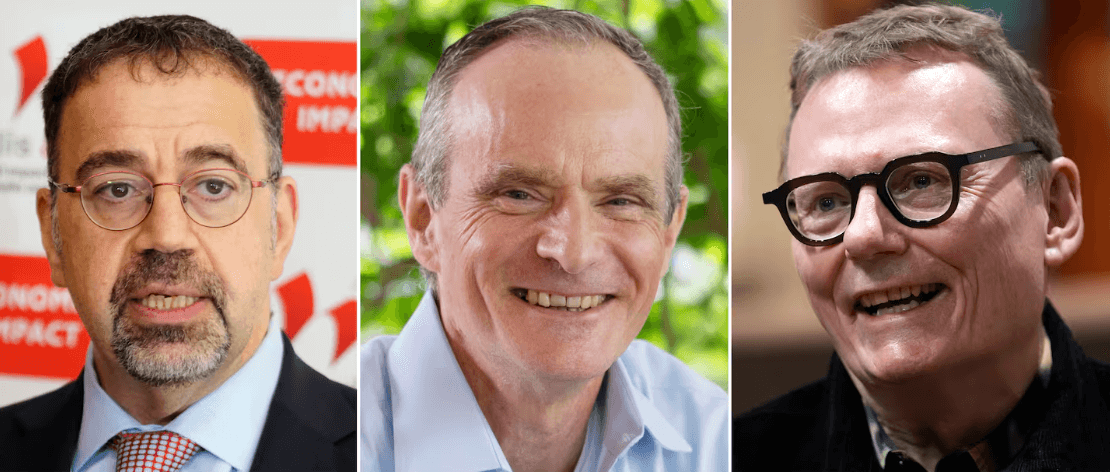两位麻省理工学院教授荣获诺贝尔经济学奖

【中美创新时报2024 年 10 月 14 日编译讯】(记者温友平编译)诺贝尔经济学纪念奖于周一颁发给麻省理工学院的两位教授达隆·阿西莫格鲁和西蒙·约翰逊,以及芝加哥大学的詹姆斯·罗宾逊,以表彰他们对各国繁荣差异的研究。美联社记者丹尼尔·尼曼和迈克·科德对此作了下述报道。
瑞典皇家科学院诺贝尔委员会在斯德哥尔摩宣布获奖结果时表示,达隆·阿西莫格鲁、西蒙·约翰逊和詹姆斯·A·罗宾逊的研究“证明了社会制度对一个国家繁荣的重要性”。
阿西莫格鲁和约翰逊在麻省理工学院工作,罗宾逊在芝加哥大学从事研究工作。
经济学奖委员会主席雅各布·斯文森表示,他们的分析“让我们更深入地了解了国家失败或成功的根本原因”。
现年 57 岁的阿西莫格鲁出生在土耳其,他即将在希腊雅典的一次会议上发言,他表示对获奖感到震惊。

“你永远想不到这样的事情,”他说。
阿西莫格鲁表示,获奖研究凸显了民主制度的价值。
“我认为,从广义上讲,我们所做的工作有利于民主,”他在与诺贝尔委员会和斯德哥尔摩记者的电话中说道。
但他补充道:“民主不是万能药。引入民主非常困难。当你引入选举时,有时会产生冲突。”
在接受美联社采访时,64 岁的罗宾逊表示,他怀疑只要中国保持压制性的政治制度,它能否维持其经济繁荣。
“世界历史上有很多这样的社会,它们在 40、50 年内表现良好,”罗宾逊在电话中说道。“你看到的是,这永远不会持续下去。……苏联在 50 或 60 年内表现良好。”
罗宾逊说,许多社会已经成功过渡到他、阿西莫格鲁和约翰逊所说的“包容性社会”。
“看看美国,”罗宾逊说。 “这是一个奴隶制、特权国家,妇女不被允许参与经济或投票。”
“目前每个相对包容和开放的国家都经历了这种转变,”他补充道。“在现代世界,你可以在韩国、台湾、毛里求斯看到这种情况。”
阿西莫格鲁和罗宾逊撰写了 2012 年畅销书《国家为何失败:权力、繁荣和贫穷的起源》,书中认为人为问题是导致国家贫穷的原因。
在他们的作品中,获奖者以横跨美墨边境的诺加莱斯市为例。
尽管有着相同的地理位置、气候和共同的文化,但边境两边的生活却截然不同。在北部亚利桑那州的诺加莱斯,居民相对富裕,寿命长;大多数孩子高中毕业。在墨西哥南部的索诺拉州诺加莱斯,居民更加贫穷,有组织犯罪和腐败猖獗。
经济学家发现,不同之处在于美国的制度保护财产权,并让公民在政府中拥有发言权。
阿西莫格鲁周一表示担心,美国和欧洲的民主机构正在失去民众的支持。
“对民主的支持处于历史最低水平,尤其是在美国,但在希腊、英国和法国也是如此,”阿西莫格鲁在雅典郊区的会议间隙表示。
“我认为这是人们对民主失望的象征,”他说。“他们认为民主没有兑现承诺。”
罗宾逊同意。“显然,你们攻击了这个国家的包容性机构,”他说。“你们的总统候选人否认自己在上次选举中失败了。所以总统(唐纳德)特朗普拒绝了公民的民主统治。……当然,我很担心。我是一个关心民生的公民。”
约翰逊告诉美联社,经济压力正在疏远许多美国人。
“许多以前属于中产阶级的人受到全球化、自动化、工会衰落以及企业理念的某种转变的严重打击,”约翰逊说。“因此,工人不再是 19 世纪和 20 世纪初需要开发的资源,而是成为需要最小化的成本……现在,这挤压了中产阶级。”
“作为一个国家,我们近几十年来未能实现我们以前非常擅长的事情,即共享繁荣,”约翰逊说。
约翰逊说,未来的关键之一是社会如何管理人工智能等新技术。
“人工智能可以朝任何方向发展,”他说。“人工智能既可以赋予受过良好教育的人权力,使他们更加熟练,使他们能够完成更多任务并获得更高的报酬。或者它可能是另一波大规模的自动化浪潮,将中产阶级的残余推向底层。然后,是的,你不会喜欢政治结果。”
在他们的研究中,经济学家们研究了英国和西班牙等欧洲列强从 17 世纪开始殖民世界大部分地区时建立的制度。他们将不同的政策带到不同的地方,为后来的研究人员提供了一个“自然实验”来分析。
人口稀少的殖民地对外国统治的抵抗力较小,因此吸引了更多的定居者。在这些地方,殖民政府倾向于建立更具包容性的经济机构,“激励定居者努力工作并投资于他们的新家园。反过来,这导致了对政治权利的要求,使他们能够分享利润,”诺贝尔委员会说。
在人口更密集、吸引更少定居者的地方,殖民政权限制政治权利,并建立了专注于“以牺牲广大民众为代价造福当地精英”的机构,诺贝尔委员会说。
“矛盾的是,这意味着大约 500 年前相对最繁荣的殖民地现在相对贫穷,”它补充道,并指出印度的工业产量在 18 世纪超过了美国殖民地。
经济学奖正式名称为瑞典银行纪念阿尔弗雷德·诺贝尔经济学奖。中央银行于 1968 年设立该奖项,以纪念 19 世纪瑞典商人和化学家诺贝尔,他发明了炸药并创立了五个诺贝尔奖。
尽管诺贝尔纯粹主义者强调经济学奖在技术上不是诺贝尔奖,但它总是与其他奖项一起在 12 月 10 日颁发,即 1896 年诺贝尔逝世周年纪念日。
上周,诺贝尔医学、物理学、化学、文学和和平奖颁奖。
科德在荷兰海牙报道,怀斯曼在华盛顿报道。美联社驻柏林记者大卫·基顿 (David Keyton) 和驻雅典记者埃琳娜·贝卡托罗斯 (Elena Becatoros) 对本报道亦有贡献。
题图:在这张组合图中,从左到右依次为:经济学家达隆·阿西莫格鲁在希腊雅典,2024 年 10 月 14 日,经济学家西蒙·约翰逊在华盛顿,2024 年 10 月 14 日,经济学家詹姆斯·罗宾逊在芝加哥,2024 年 10 月 14 日。未注明来源/美联社
附原英文报道:
Two MIT professors among recipients of Nobel prize in economics
By DANIEL NIEMANN and MIKE CORDER The Associated Press,Updated October 14, 2024
In this combination image left to right; Economist Daron Acemoglu in Athens Greece, Oct. 14, 2024, Economist Simon Johnson in Washington, Oct. 14, 2024, and Economist James A. Robinson in Chicago, Oct. 14, 2024.Uncredited/Associated Press
STOCKHOLM (AP) — The Nobel memorial prize in economics was awarded Monday to Daron Acemoglu and Simon Johnson, two professors from the Massachusetts Institute of Technology, and James A. Robinson, of the University of Chicago, for research into differences in prosperity between nations.
The work by Daron Acemoglu, Simon Johnson and James A. Robinson “demonstrated the importance of societal institutions for a country’s prosperity,” the Nobel committee of the Royal Swedish Academy of Sciences said at the announcement in Stockholm.
Acemoglu and Johnson work at the Massachusetts Institute of Technology, while Robinson does his research at the University of Chicago.
Jakob Svensson, chair of the Committee for the Prize in Economic Sciences, said their analysis has provided “a much deeper understanding of the root causes of why countries fail or succeed.”
Reached by the academy in Athens, Greece, where he was to speak at a conference, the Turkish-born Acemoglu, 57, said he was astonished by the award.
“You never expect something like this,” he said.
Acemoglu said the research honored by the prize underscores the value of democratic institutions.
“I think broadly speaking the work that we have done favors democracy,” he said in a telephone call with the Nobel committee and reporters in Stockholm.
But, he added: “Democracy is not a panacea. Introducing democracy is very hard. When you introduce elections, that sometimes creates conflict.”
In an interview with The Associated Press, Robinson, 64, said he doubts that China can sustain its economic prosperity as long as it keeps a repressive political system.
“There’s many examples in world history of societies like that that do well for 40, 50 years,” Robinson said by phone. “What you see is that’s never sustainable. … The Soviet Union did well for 50 or 60 years.’’
Robinson said many societies have successfully made the transition to what he, Acemoglu and Johnson call an “inclusive society.’’
“Look at the United States,” Robinson said. “This was a country of slavery, of privilege, where women were not allowed to take part in the economy or vote.”
“Every country that is currently relatively inclusive and open made that transition,” he added. “In the modern world, you’ve seen that in South Korea, in Taiwan, in Mauritius.’’
Acemoglu and Robinson wrote the 2012 bestseller, “Why Nations Fail: The Origins of Power, Prosperity, and Poverty,” which argued that manmade problems were responsible for keeping countries poor.
In their work, the winners looked, for instance, at the city of Nogales, which straddles the U.S.-Mexico border.
Despite sharing the same geography, climate and a common culture, life is very different on either side of the border. In Nogales, Arizona, to the north, residents are relatively well-off and live long lives; most children graduate from high school. To the south, in Mexico’s Nogales, Sonora, residents are much poorer, and organized crime and corruption abound.
The difference, the economists found, is a U.S. system that protects property rights and gives citizens a say in their government.
Acemoglu expressed worry Monday that democratic institutions in the United States and Europe were losing support from the population.
“Support for democracy is at an all-time low, especially in the U.S., but also in Greece and in the UK and France,” Acemoglu said on the sidelines of the conference in an Athens suburb.
“And I think that is a symbol of how people are disappointed with democracy,” he said. “They think democracy hasn’t delivered what it promised.’’
Robinson agreed. “Clearly, you had an attack on inclusive institutions in this country,” he said. “You had a presidential candidate who denied that he lost the last election. So President (Donald) Trump rejected the democratic rule of the citizens. … Of course, I’m worried. I’m a concerned citizen.”
Johnson told the AP that economic pressures were alienating many Americans.
“A lot of people who were previously in the middle class were hit very hard by the combination of globalization, automation, the decline of trade unions, and a sort of shift more broadly in corporate philosophy,’’ Johnson said. “So instead of workers being a resource to be developed, which they were in the 19th and early 20th century, they became a cost to be minimized … Now, that squeezed the middle class.’’
“We have, as a country, failed to deliver in recent decades on what we were previously very good at, which was sharing prosperity,’’ Johnson said.
One key for the future, Johnson said, is how societies manage new technologies such as artificial intelligence.
“AI could go either way,” he said. “AI could either empower people with a lot of education, make them more highly skilled, enable them to do more tasks and get more pay. Or it could be another massive wave of automation that pushes the remnants of the middle down to the bottom. And then, yes, you’re not going to like the political outcomes.’’
In their work, the economists studied institutions that European powers such as Britain and Spain put in place when they colonized much of the world starting in the 1600s. They brought different policies to different places, giving later researchers a “natural experiment” to analyze.
Colonies that were sparsely populated offered less resistance to foreign rule and therefore attracted more settlers. In those places, colonial governments tended to establish more inclusive economic institutions that “incentivized settlers to work hard and invest in their new homeland. In turn, this led to demands for political rights that gave them a share of profits,” the Nobel committee said.
In more densely populated places that attracted fewer settlers, the colonial regimes limited political rights and set up institutions that focused on “benefiting a local elite at the expense of the wider population,” it said.
“Paradoxically, this means that the parts of the colonized world that were relatively the most prosperous around 500 years ago are now those that are relatively poor,” it added, noting that India’s industrial production exceeded the American colonies’ in the 18th century.
The economics prize is formally known as the Bank of Sweden Prize in Economic Sciences in Memory of Alfred Nobel. The central bank established it in 1968 as a memorial to Nobel, the 19th-century Swedish businessman and chemist who invented dynamite and established the five Nobel Prizes.
Though Nobel purists stress that the economics prize is technically not a Nobel Prize, it is always presented together with the others on Dec. 10, the anniversary of Nobel’s death in 1896.
Nobel honors were announced last week in medicine, physics, chemistry, literature and peace.
Corder reported from The Hague, Netherlands, and Wiseman from Washington. AP reporters David Keyton in Berlin and Elena Becatoros in Athens contributed to this report.

